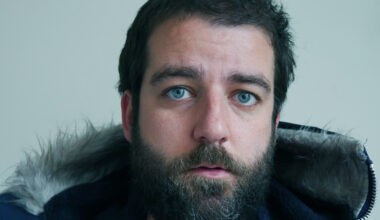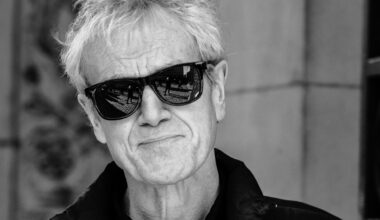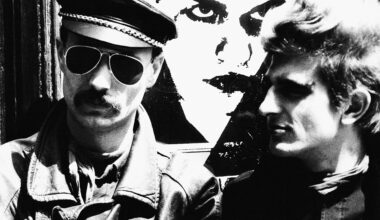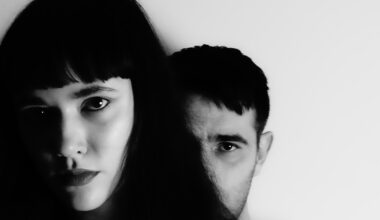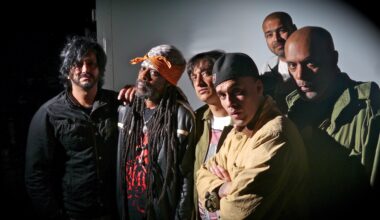Former DFA recording artists Yacht have their very own belief system. They have a manifesto too. Not only that, the Los Angeles outfit produce shiny electronic pop music with side orders of extraterrestrial intelligence and future gazing. And it really is as marvellous as that all sounds
“People always want to know about the alien stuff. It’s sticky…”
So says Claire L Evans, one half of YACHT, the Los Angeles-based band/conceptual art project whose new release, ‘I Thought The Future Would Be Cooler’, with its canny underground suss welded on to some magnificent contemporary electronic pop, might just be one of the albums of the year. Her partner is Jona Bechtolt, who started YACHT as a solo vehicle in Portland, Oregon, back in 2002. And in case you are wondering why all the shouting – YACHT! – the band name must be capitalised because it’s an acronym: Young Americans Challenging High Technology.
YACHT believe in extraterrestrial intelligence. It says so on their website, in a section headed ‘Trust’. They also believe piracy isn’t theft. “We subscribe to the free online dissemination of all things, including our own music,” they declare. One time, Jona made an entire album from samples of Nirvana. But then he mentioned he had used pirated plug-ins to do so during an interview and got called out by the software company who made the plug-ins. Jona being Jona, he apologised and paid up.
YACHT like to be explicit about their beliefs, even when it gets them into trouble. They like other people to be upfront about theirs, too. “We call it radical transparency,” they say.
“All bands have belief systems, all people do,” Claire insists. “We’re always interested in knowing what people believe. A lot of artists have a hard time being explicitly political, or making explicit social commentary, or presenting their ideologies clearly because of fear of comments on YouTube. People are afraid to be vulnerable in that way. We like to position our thoughts really clearly.”
“There’s too much focus on one’s personal brand these days,” says Jona. “Anything that tarnishes it or makes it less accessible is avoided.”
“Or even makes it identifiable in the way that you could have a negative opinion about,” adds Claire. “There’s a lot of ambiguity in music because people don’t want to take a clear stance on things. When you do, there’s always a chance someone could disagree with you.”
Hence the pretty strong thread of sympathy towards, or at least interest in, various ideologies in the world of YACHT. Their 2009 album, ‘See Mystery Lights’, takes its title from the phenomenon of people seeing strange lights in the night sky. Tracks like ‘The Afterlife’, with its river baptism video, and ‘Psychic City (Voodoo City)’, which is preceded by a Michael Jackson-esque “Due to my strong personal convictions…” type of disclaimer, all give YACHT an air of cultishness.
Oh, and there’s also the YACHT manifesto. All decent cults need one. Claire reads it out to me (and later emails me a PDF version too). They made lots of copies of it and handed them out in LA, the city they now call home.
Los Angeles is, of course, a place where new trends and oddball doctrines and crackers notions sprout up like mushrooms – and where these always seem to find plenty of eager recruits. YACHT, one suspects, know this. Part of their appeal is their aesthetic, which plays around with slickly designed PR stunts and ideas, including radical transparency, a kind of endless innocence about sharing information and beliefs.
“There’s always a new extreme innovation in juice,” says Claire. “There’s a juice place in our neighbourhood that sells a $20 juice. Fungal rhizomes… it’s next level.”
“It’s marketed as the $20 juice, like it’s something to be proud of,” adds Jona, acknowledging LA’s reputation as a beacon for the gullible.
“You have that cereal café in London, don’t you?” says Claire. “People need to be presented with extremely manufactured experiences. You can’t just have a bowl of cereal at home, it has to be ‘the cereal experience’, the cereal-themed experience, a level of abstraction that we seem to require now in order to enjoy something. It might be a consequence of our extremely mediated reality.”
Are YACHT satirising these developments? Yes. And no. Like complaining about traffic when you are traffic, they’re as implicated in the hipster/technology bind as the rest of us. When I mention that a lot of this reminds me of Devo, who peddled a philosophy similarly born of a bleak analysis of mankind’s inherent stupidity alongside their exciting electronic pop, and also relocated to LA when the going got wacky, it’s met with an enthusiastic response.
“The thing that’s so brilliant about Devo is that there are so many ways of consuming Devo,” says Claire. “Most people think of them as that weird synth band that did that song ‘Whip It’ and wore funny hats. And that’s a valid way to consume them. But then you look a bit deeper and you realise there is this incredibly thorough satirical and intellectual thing that’s happening beneath all that stuff…”
“Not to mention an incredible catalogue of music,” adds Jona.
And there’s the rub. All the clever philosophy, satire and chic graphic design in the world isn’t going to matter one bit unless there’s some decent music there. Fortunately for us, ‘I Thought The Future Would Be Cooler’ is stuffed with it.
The album opener, ‘Miles and Miles’, lays out YACHT’s stall pretty effectively. It starts tiny, a single synth being poked attractively, Claire singing about the emptiness of space and the loneliness of life on Earth, before the song explodes into a mirror ball of huge disco strings, and bounds along full of excitement and optimism and an almost rockist headrush which (and they probably won’t thank me for this) is vaguely reminiscent of Billy Idol’s ‘White Wedding’. The whole album seems to combine this nihilistic and grim analysis of life, but stitches it into a can-do American positivity and a pop sensibility that delivers hook after hook.

“We try not to make the same song twice… and definitely not the same album twice,” says Jona. “So we’ve changed the process literally every time we’ve written a song.”
Claire and Jona used to make a virtue from working with limited equipment, in a sealed world of their own, applying a lo-fi DIY ethic to their productions. It was good enough for DFA Records, who released two YACHT albums (the aforementioned ‘See Mystery Lights’, followed by ‘Shangri-La’ in 2011) and who were undoubtedly attracted by their inherent groove, historical referencing and ability to put on a pretty great live show.
With ‘I Thought The Future Would Be Cooler’, however, YACHT have thrown open the doors, inducting long-time live band member Rob Kieswetter (who has had his own Bobby Birdman project on the go since 2002) into the creative process and recruiting top-drawer producer Jacknife Lee, who has helmed albums by U2, Taylor Swift and One Direction.
The high-gloss electronic pop sheen, with its impressive production credits and a sound to suit mainstream radio, is made entirely palatable because YACHT’s output is back-loaded with much anxiety and fuck-you attitude, not to mention some absolutely impeccable influences, all of which is abundant in their cover of Family Fodder’s ‘I Want To Fuck You Till I’m Dead’. Family Fodder, in case they slipped by under your radar, are a UK outfit centred around multi-instrumentalist Alig Fodder. They have been releasing mini-masterpieces of ultra-indie psych wonder since 1979, influencing the likes of Stereolab along the way.
“I was very embarrassed about playing that song to my parents,” says Claire. “But it’s so tender, it’s about wanting to give everything of yourself to one person with total abandon in such a sweet way.”
“I’ve been a huge fan of Family Fodder forever,” says Jona. “I think their ‘Savoir Faire’ single is a perfect song, maybe my very favourite song of all time. I love Family Fodder’s ‘Debbie Harry’ and ‘Film Music’ too. Those three songs are like the perfect trifecta.”
Talking of Debbie Harry, the title cut of ‘I Thought The Future Would Be Cooler’ is clearly in the thrall of Blondie’s ‘Rapture’ and their cover of ‘The Tide Is High’, copping those gorgeous swooping vocals and the even bells. It’s more than a simple homage to the truly great Blondie, though. Somehow, despite being in Los Angeles 35 years later, YACHT belong to that post-punk New York scene, where the music industry was briefly at the mercy of bands determined to forge new kinds of idiosyncratic pop sounds.
That said, the video for ‘I Thought The Future Would Be Cooler’ skewers pretty much every contemporary tech obsession, from vaping to drones to Apple watches. The album also does a fine line in post-modernist material like ‘Ringtone’, with its zeitgeist punching chant of “Ringtone! Ringtone!”, which is about as millennial a pop song you’re likely to hear this side of Taylor Swift. Another high-energy high point from a record that is, frankly, full of them, is ‘The War On Women Is Over”, a livid post-punk workout that deals sarcastic lines such as “The war on women is over / If you close your eyes” with considerable rage.
“I don’t get yelled at in the street, I don’t feel threatened, I largely don’t feel unsafe,” says Claire. “But on the internet, it’s a different story. There’s no image of me on the internet that doesn’t have some horrible thing written underneath it. Anyone who makes art in the 21st century – music, photography, anything that has public documentation on the web – experiences some degree of unprecedented vitriol about what they do. That’s being public in the 21st century. But being public and also being a woman, it’s several degrees deeper and darker.
“I have all kinds of comment blockers on my web browsers so that I don’t read the comments anymore, it can lead to one’s undoing. It’s very dispiriting to work on something you’re passionate about and then receive the most base, misogynistic commentary about your body, or the criminal sin of having short hair, or whatever it is that some jerk on the internet thinks is important.”
You thought the future would be cooler?
“I think about it a lot. I’ve been doing loads of research recently about the early internet, because I’m working on a project about it. In the beginning, when it was less a one-to-one representation of the world and was still something that was a bit subversive and undergroundy, people were very excited about anonymity as something that would be very liberating. Feminists were writing extensively about how we would be able to express ourselves without any fear of judgement or limitation of gender in the freeing space of the web, but that has kind of turned around, and anonymity enables the darkest and most horrific kind of commentary against women.”
Before we go, I want to clear up something about the album’s artwork. Claire is pictured on the cover in a blank, clinical environment, her cropped hair bleached, her make-up muted, dressed in a white sci-fi tunic. The only real colour in the image comes from her rather startling three arms, which are covered in red latex gloves.
“I’m the third arm,” reveals Jona. “It’s a practical effect, not a Photoshop job.”
You’re actually under the desk with your arm poking up?
“Yes.”
“We wanted to pick an image that would appear futuristic in some way, but not be immediately dated,” says Claire. “Which is very difficult, without it looking like some retro futurist kitschy thing within a few years. It speaks of being of the future without me wearing some wacky glasses.”
So what does it mean?
“I guess that the focus has shifted to Claire with this album,” replies Jona. “And that while I don’t sing any of the songs on this record, I’m still attached.”
“He’s the manipulating hand that controls a lot of things that are happening.”
“I’m not the puppet master, just the third arm.”
That’s cleared that up, then. As YACHT say themselves in the final line of their manifesto, it’s easy to feel disillusioned, if only it wasn’t all so funny sometimes…
The Yacht Manifesto
The future is an impossible goal. It’s something we chase after, believing in an illusion of control. That isn’t to say our actions don’t affect what the future is like— in our case, hot, dry, loud, unjust—but that once we catch up to yesterday’s future, it’s no longer what we imagined. It’s just the present all over again. And so on.
We’ve made an album about that. It contains some speculations about the future that are big and distant as science fiction stories. But it’s also about looking carefully at the world around us and trying to understand what we’ve done with the imaginations of those who came before us. Would they believe it?
We live in a complex moment. There seem to be networks at every level of reality; as with all our technologies, we can’t keep ourselves from grabbing them, turning them around, and using them as a mirror. Every person is a node. Our technological economy is full of entities selling our own lives back to us. It’s easy to feel disillusioned, if only it wasn’t all so funny sometimes.
‘I Thought The Future Would Be Cooler’ is on Downtown

